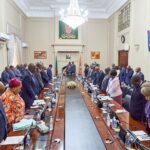In a significant legal development, the Court of Appeal has ruled in favor of Tasila Lungu, the daughter of former President Edgar Lungu, allowing her to reclaim her K8 million farm in Sinda District, Eastern Province. The decision came after a stay of judgment was granted, halting the forfeiture of the property to the state.
This legal battle began when the Economic and Financial Crimes Court ordered the forfeiture of the farm on September 17, 2024. The court cited unexplained wealth and a significant disparity between Tasila Lungu’s known income and the value of the property. The forfeiture order was part of an ongoing investigation into alleged corruption and unexplained accumulation of wealth.
However, in a ruling delivered by Judge Kelvin Muzenga, the Court of Appeal allowed the stay of judgment, effectively returning control of the property to Ms. Lungu. The court imposed a condition, preventing the sale of the farm until the final determination of the appeal. This decision means that the property will remain under Ms. Lungu’s control for the time being, with the matter to be further examined in future proceedings.
Ms. Lungu’s legal representative, Charles Chingano, confirmed the court’s decision, highlighting that the case remains ongoing and subject to further legal scrutiny. The judgment is seen as a temporary reprieve, with the final determination of the case still pending.
The ruling has sparked mixed reactions among the public, with some questioning the decision and others raising concerns about the transparency and integrity of the legal process. A number of commentators have noted that while the Court of Appeal’s ruling offers Ms. Lungu a chance to retain her property, the matter is far from settled, as both the original judgment and the appeal may be revisited by higher courts.
One of the key points raised in the public discourse is the impact of this ruling on the perception of justice in the country, especially in cases involving high-profile figures. Critics argue that the ongoing legal battles surrounding wealth and property accumulation by individuals associated with political elites are indicative of broader issues in the legal and political systems.
Despite these concerns, legal experts emphasize that the Court of Appeal’s stay of execution is a procedural step in the judicial process. It allows the parties involved to present their arguments, and the matter will be decided based on the law and the available evidence.
As the case progresses, all eyes will be on how the legal system addresses allegations of unexplained wealth and the broader questions of transparency and accountability in the management of public and private assets. Whether or not the final judgment will uphold the Court of Appeal’s decision remains to be seen, but for now, Tasila Lungu has regained control of her farm, pending further legal proceedings.
The outcome of this case will likely continue to fuel public debate on the effectiveness of Zambia’s legal system in handling corruption and the wealth of political figures. As the appeal process unfolds, both supporters and critics of the decision will be watching closely to see how the courts ultimately resolve this high-profile matter.






